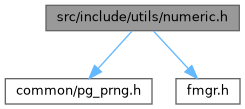

Go to the source code of this file.
Typedefs | |
| typedef struct Node | Node |
| typedef struct NumericData * | Numeric |
Functions | |
| static Numeric | DatumGetNumeric (Datum X) |
| static Numeric | DatumGetNumericCopy (Datum X) |
| static Datum | NumericGetDatum (Numeric X) |
| bool | numeric_is_nan (Numeric num) |
| bool | numeric_is_inf (Numeric num) |
| int32 | numeric_maximum_size (int32 typmod) |
| char * | numeric_out_sci (Numeric num, int scale) |
| char * | numeric_normalize (Numeric num) |
| Numeric | int64_to_numeric (int64 val) |
| Numeric | int64_div_fast_to_numeric (int64 val1, int log10val2) |
| Numeric | numeric_add_safe (Numeric num1, Numeric num2, Node *escontext) |
| Numeric | numeric_sub_safe (Numeric num1, Numeric num2, Node *escontext) |
| Numeric | numeric_mul_safe (Numeric num1, Numeric num2, Node *escontext) |
| Numeric | numeric_div_safe (Numeric num1, Numeric num2, Node *escontext) |
| Numeric | numeric_mod_safe (Numeric num1, Numeric num2, Node *escontext) |
| int32 | numeric_int4_safe (Numeric num, Node *escontext) |
| int64 | numeric_int8_safe (Numeric num, Node *escontext) |
| Numeric | random_numeric (pg_prng_state *state, Numeric rmin, Numeric rmax) |
Macro Definition Documentation
◆ NUMERIC_MAX_DISPLAY_SCALE
| #define NUMERIC_MAX_DISPLAY_SCALE NUMERIC_MAX_PRECISION |
◆ NUMERIC_MAX_PRECISION
◆ NUMERIC_MAX_RESULT_SCALE
| #define NUMERIC_MAX_RESULT_SCALE (NUMERIC_MAX_PRECISION * 2) |
◆ NUMERIC_MAX_SCALE
◆ NUMERIC_MIN_DISPLAY_SCALE
◆ NUMERIC_MIN_SCALE
◆ NUMERIC_MIN_SIG_DIGITS
◆ PG_GETARG_NUMERIC
| #define PG_GETARG_NUMERIC | ( | n | ) | DatumGetNumeric(PG_GETARG_DATUM(n)) |
◆ PG_GETARG_NUMERIC_COPY
| #define PG_GETARG_NUMERIC_COPY | ( | n | ) | DatumGetNumericCopy(PG_GETARG_DATUM(n)) |
◆ PG_RETURN_NUMERIC
Typedef Documentation
◆ Node
◆ Numeric
| typedef struct NumericData* Numeric |
Function Documentation
◆ DatumGetNumeric()
Definition at line 64 of file numeric.h.
References fb(), and PG_DETOAST_DATUM.
Referenced by copyScalarSubstructure(), datum_to_jsonb_internal(), executeItemOptUnwrapTarget(), executeNumericItemMethod(), executeUnaryArithmExpr(), extract_date(), gbt_numeric_consistent(), gbt_numeric_penalty(), generate_series_numeric_support(), getArrayIndex(), hstore_to_jsonb_loose(), jsonb_in_scalar(), JsonbValueInitNumericDatum(), numeric_absolute(), numeric_fast_cmp(), numeric_half_rounded(), numeric_to_char(), numeric_to_number(), numeric_truncated_divide(), pg_size_bytes(), PLyNumber_ToJsonbValue(), SV_to_JsonbValue(), timestamp_part_common(), and timestamptz_part_common().
◆ DatumGetNumericCopy()
Definition at line 70 of file numeric.h.
References fb(), and PG_DETOAST_DATUM_COPY.
Referenced by jsonb_numeric().
◆ int64_div_fast_to_numeric()
Definition at line 4280 of file numeric.c.
References DEC_DIGITS, NumericVar::dscale, fb(), free_var(), init_var, int128_add_int64_mul_int64(), int128_to_numericvar(), int64_to_int128(), int64_to_numericvar(), lengthof, make_result(), pg_mul_s64_overflow(), StaticAssertDecl, unlikely, and NumericVar::weight.
Referenced by interval_part_common(), time_part_common(), timestamp_part_common(), timestamptz_part_common(), and timetz_part_common().
◆ int64_to_numeric()
Definition at line 4259 of file numeric.c.
References free_var(), init_var, int64_to_numericvar(), make_result(), and val.
Referenced by cash_numeric(), datum_to_jsonb_internal(), executeItemOptUnwrapTarget(), executeKeyValueMethod(), extract_date(), gbt_numeric_penalty(), int2_numeric(), int4_numeric(), int8_accum(), int8_accum_inv(), int8_avg(), int8_numeric(), int8_sum(), int8_to_char(), interval_part_common(), numeric_avg(), numeric_cash(), numeric_half_rounded(), numeric_poly_avg(), numeric_to_char(), numeric_to_number(), numeric_truncated_divide(), pg_size_bytes(), pg_size_pretty_numeric(), SV_to_JsonbValue(), time_part_common(), timestamp_part_common(), timestamptz_part_common(), and timetz_part_common().
◆ numeric_add_safe()
Definition at line 2881 of file numeric.c.
References add_var(), Assert, const_nan, const_ninf, const_pinf, fb(), free_var(), init_var, init_var_from_num(), make_result(), make_result_safe(), NUMERIC_IS_NAN, NUMERIC_IS_NINF, NUMERIC_IS_PINF, and NUMERIC_IS_SPECIAL.
Referenced by executeItemOptUnwrapTarget(), interval_part_common(), numeric_add(), timestamp_part_common(), and timestamptz_part_common().
◆ numeric_div_safe()
Definition at line 3152 of file numeric.c.
References Assert, const_nan, const_ninf, const_pinf, const_zero, div_var(), ereturn, errcode(), errmsg(), fb(), free_var(), init_var, init_var_from_num(), make_result(), make_result_safe(), NUMERIC_IS_NAN, NUMERIC_IS_NINF, NUMERIC_IS_PINF, NUMERIC_IS_SPECIAL, numeric_sign_internal(), and select_div_scale().
Referenced by executeItemOptUnwrapTarget(), numeric_div(), timestamp_part_common(), and timestamptz_part_common().
◆ numeric_int4_safe()
Definition at line 4364 of file numeric.c.
References ereturn, errcode(), errmsg(), fb(), init_var_from_num(), NUMERIC_IS_NAN, NUMERIC_IS_SPECIAL, numericvar_to_int32(), and x.
Referenced by executeDateTimeMethod(), executeItemOptUnwrapTarget(), getArrayIndex(), numeric_int4(), and numeric_to_char().
◆ numeric_int8_safe()
Definition at line 4434 of file numeric.c.
References ereturn, errcode(), errmsg(), fb(), init_var_from_num(), NUMERIC_IS_NAN, NUMERIC_IS_SPECIAL, numericvar_to_int64(), and x.
Referenced by executeItemOptUnwrapTarget(), and numeric_int8().
◆ numeric_is_inf()
Definition at line 845 of file numeric.c.
References NUMERIC_IS_INF.
Referenced by datum_to_jsonb_internal(), executeItemOptUnwrapTarget(), and PLyNumber_ToJsonbValue().
◆ numeric_is_nan()
Definition at line 834 of file numeric.c.
References NUMERIC_IS_NAN.
Referenced by datum_to_jsonb_internal(), executeItemOptUnwrapTarget(), gbt_numeric_penalty(), pg_lsn_mii(), pg_lsn_pli(), and PLyNumber_ToJsonbValue().
◆ numeric_maximum_size()
Definition at line 936 of file numeric.c.
References DEC_DIGITS, fb(), is_valid_numeric_typmod(), NUMERIC_HDRSZ, and numeric_typmod_precision().
Referenced by type_maximum_size().
◆ numeric_mod_safe()
Definition at line 3355 of file numeric.c.
References const_nan, duplicate_numeric(), ereturn, errcode(), errmsg(), fb(), free_var(), init_var, init_var_from_num(), make_result(), make_result_safe(), mod_var(), NUMERIC_IS_INF, NUMERIC_IS_NAN, NUMERIC_IS_SPECIAL, and numeric_sign_internal().
Referenced by executeItemOptUnwrapTarget(), and numeric_mod().
◆ numeric_mul_safe()
Definition at line 3033 of file numeric.c.
References Assert, const_nan, const_ninf, const_pinf, NumericVar::dscale, fb(), free_var(), init_var, init_var_from_num(), make_result(), make_result_safe(), mul_var(), NUMERIC_DSCALE_MAX, NUMERIC_IS_NAN, NUMERIC_IS_NINF, NUMERIC_IS_PINF, NUMERIC_IS_SPECIAL, numeric_sign_internal(), and round_var().
Referenced by executeItemOptUnwrapTarget(), and numeric_mul().
◆ numeric_normalize()
Definition at line 1009 of file numeric.c.
References fb(), get_str_from_var(), init_var_from_num(), NUMERIC_IS_NINF, NUMERIC_IS_PINF, NUMERIC_IS_SPECIAL, pstrdup(), str, and x.
Referenced by make_scalar_key().
◆ numeric_out_sci()
Definition at line 975 of file numeric.c.
References get_str_from_var_sci(), init_var_from_num(), NUMERIC_IS_NINF, NUMERIC_IS_PINF, NUMERIC_IS_SPECIAL, pstrdup(), scale, str, and x.
Referenced by int8_to_char(), and numeric_to_char().
◆ numeric_sub_safe()
Definition at line 2957 of file numeric.c.
References Assert, const_nan, const_ninf, const_pinf, fb(), free_var(), init_var, init_var_from_num(), make_result(), make_result_safe(), NUMERIC_IS_NAN, NUMERIC_IS_NINF, NUMERIC_IS_PINF, NUMERIC_IS_SPECIAL, and sub_var().
Referenced by executeItemOptUnwrapTarget(), numeric_sub(), timestamp_part_common(), and timestamptz_part_common().
◆ NumericGetDatum()
Definition at line 76 of file numeric.h.
References fb(), and PointerGetDatum().
Referenced by cash_numeric(), compareNumeric(), copyScalarSubstructure(), ExecGetJsonValueItemString(), executeItemOptUnwrapTarget(), executeNumericItemMethod(), executeUnaryArithmExpr(), gbt_numeric_penalty(), generate_series_step_numeric(), getArrayIndex(), gin_numeric_cmp(), int8_avg(), int8_sum(), iterate_jsonb_values(), jsonb_float4(), jsonb_float8(), jsonb_int2(), jsonb_int4(), jsonb_int8(), jsonb_numeric(), JsonbHashScalarValue(), JsonbHashScalarValueExtended(), JsonbValue_to_SV(), numeric_absolute(), numeric_avg(), numeric_cash(), numeric_float4(), numeric_float8(), numeric_half_rounded(), numeric_is_less(), numeric_poly_avg(), numeric_to_char(), numeric_to_cstring(), numeric_to_number(), numeric_truncated_divide(), pg_lsn_mii(), pg_lsn_pli(), pg_size_bytes(), PLyObject_FromJsonbValue(), printJsonPathItem(), timestamp_part_common(), and timestamptz_part_common().
◆ random_numeric()
|
extern |
Definition at line 4204 of file numeric.c.
References ereport, errcode(), errmsg(), ERROR, fb(), free_var(), init_var, init_var_from_num(), make_result(), NUMERIC_IS_NAN, NUMERIC_IS_SPECIAL, and random_var().
Referenced by numeric_random().